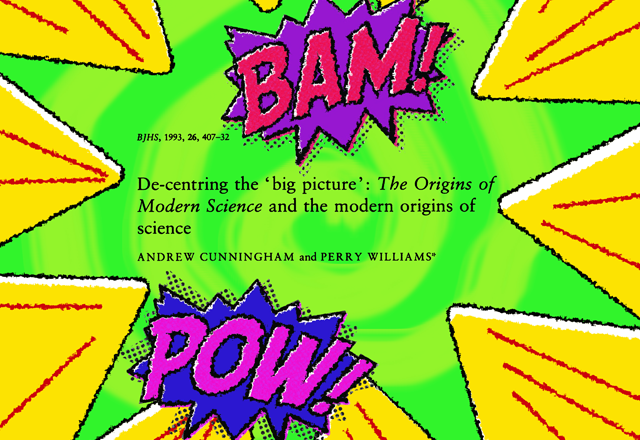Lindy Orthia: What's wrong with talking about the Scientific Revolution?

Knowing more about the history of science can change the way we think about science communication, according to a new paper by CPAS academic Dr Lindy Orthia.
The paper, published in Minerva this week, is a review of 20 years of journal papers that talk about the Scientific Revolution, starting with an influential paper by historians Andrew Cunningham and Perry Williams from 1993.
The review shows that the traditional 'big picture' view of the history of science, which centres on the idea of the Scientific Revolution, has only limited empirical basis and desperately needs to be challenged.
"Science communicators, science teachers and science policy experts who have based their opinions about the place of science in society in part upon this old big picture view of history may want to reconsider their worldview," said Dr Orthia.
Dr Orthia used Cunningham and Williams' paper as the basis for her review, analysing how researchers between 1994 and 2014 engaged with Cunninham and Williams' key ideas.
Cunningham and Williams argued that the old big picture of the history of science needs to be replaced with a new big picture. In their conception, that new big picture would 'de-centre' modern western science within the great diversity of human knowledge systems, and place it more on an equal footing with every other knowledge system. They argued that modern, western science was entirely and only modern and western, rather than being seen to be the pinnacle of a universal human activity as the Eurocentric old big picture had suggested.
Cunningham and Williams proposed instead that (modern, western) science was invented during the 'Age of Revolutions' - the late eighteenth to early nineteenth centuries - in the sense that this was the time that the word science gained its current narrow and secular definition, 'scientist' became a profession, disciplines like geology, physics, biology and chemistry were consolidated, and generally knowledge-making became institutionalised in western Europe in the ways that we recognise today.
In other words, they defined science by its institutional and ideological features, rather than by the origin point of any of its contents.
"When I first read Cunningham and Williams' work I was blown away," said Dr Orthia. "They challenged a whole worldview I had been raised with, in exciting ways. So I wanted to see if other researchers thought their thesis had merit or was a load of rubbish."
Dr Orthia's review revealed a large degree of support for Cunningham and Williams' view.
"No one has contradicted the idea that modern, western science was institutionalised, professionalised, consolidated - essentially invented - during the so-called Age of Revolutions. And no one really defends the old big picture anymore. It seems that, even for historians primarily interested in the seventeenth century natural philosophy of people like Newton, the old big picture based on the Scientific Revolution is dead," she said.
The review discusses the implications for people in what Dr Orthia has called 'applied fields of science studies' - science communication, science education, and science policy.
"One of the big questions now is, when we use the word 'science', do we still intend it to be basically synonymous with 'knowledge of the natural world' as we often have done in the past? Or do we intend it to refer to a social movement that started in western Europe in the late 1700s and became a whole system of belief? Is it the modern, western institution we're committed to or the idea of understanding how nature works? The past 20 years of history of science research tells us we need to think more deeply about that."
Picture: a t-shirt design by Dr Orthia based on Cunningham and Williams' paper.
